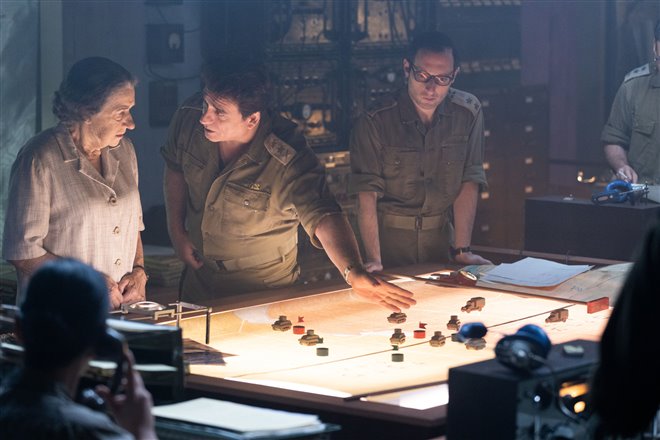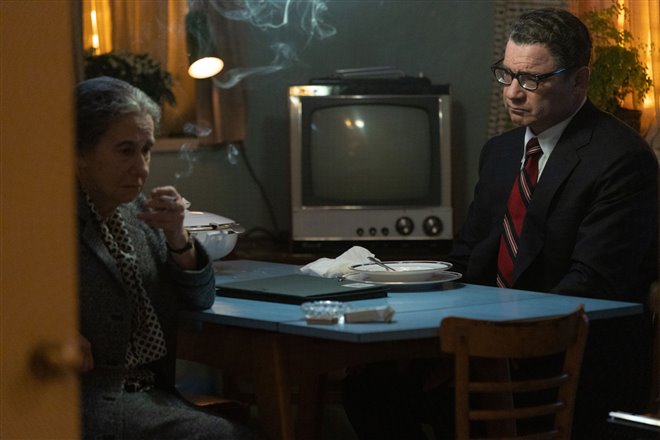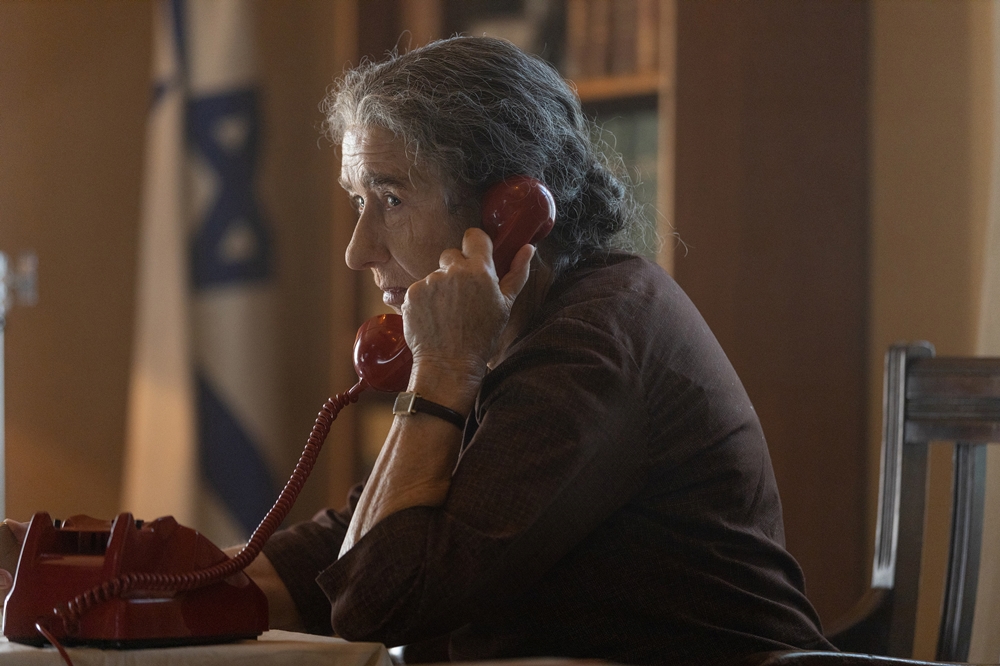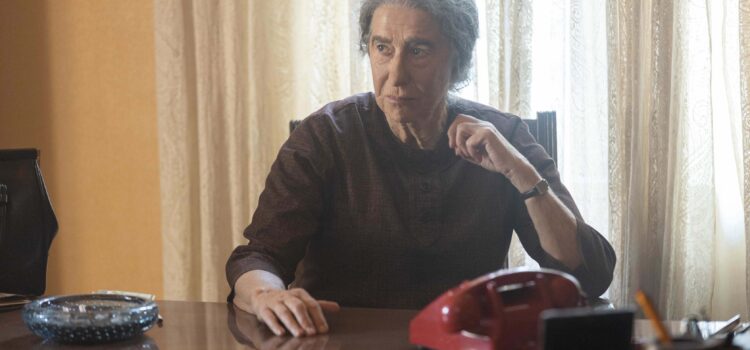By Lynn Venhaus
Known as “The Iron Lady of Israel,” Golda Meir was a shrewd, smart, intuitive and empathetic leader during a tumultuous time. The film “Golda” focuses on three horrific weeks when her country was in serious jeopardy, and the decisions she made then.
During her term as prime minister from 1969 to 1974, Meir not only had to deal with the surprise attack by Egypt and Syria in 1973, but also the tragic deaths of 11 Israeli athletes at the Munich Summer Olympics in 1972.
Set during the tense 19 days of the Yom Kippur War in 1973, Meir (Helen Mirren) must navigate overwhelming odds, a skeptical cabinet, and a complex relationship with the U.S. Secretary of State Henry Kissinger (Liev Schreiber). Millions of lives are in the balance.
In a cloud of cigarette smoke, Mirren is transformed into the Ukrainian-born head of state, who lived in the U.S. in her younger days, and became a prominent activist and politician after moving to Palestine with her husband in 1917. She was one of two women who signed Israel’s declaration of independence in 1948.
Meir is a fascinating historical figure, but you won’t find out her backstory or much information about her life other than the period the movie focuses on, which is detrimental to its appeal. But Mirren depicts her revered toughness without being showy.
The 78-year-old actress is practically unrecognizable, with an expert job done by Karen Hartley on hair and make-up design and Suzi Battersby on prosthetic design. Hunched over, defiantly chain-smoking (up to and after her cancer treatments), and walking in comfortable orthopedic shoes, Mirren assumes the persona as a courageous, maternal grandmother.
She’s not the only Oscar winner to tackle playing Golda. In her final role, Ingrid Bergman won an Emmy for the 1982 TV-movie “A Woman Called Golda,” and Anne Bancroft played the role in William Gibson’s play on Broadway.

With its focus on the maneuverings in The War Room, we only hear the terrified cries of soldiers in combat, and don’t see that action up close and personal. That’s director Guy Nattiv’s choice, but the film feels remote and stodgy without war scenes.
He specifically uses cigarettes and the act of smoking as part of the storytelling, and overflowing ashtrays are meant to signify passage of time. But the billowing smoke becomes distracting, and its heavy use debatable.
Nattiv may have intended his film to be more like a thriller, but its serious-mindedness turns it dull at times. He and his wife, Jaime Ray Newman, won an Academy Award in 2019 for their short film “Skin,” which looks at a reformed neo-Nazi and racism.
Screenwriter Nicholas Martin, who wrote the 2016 movie starring Meryl Streep as socialite singer “Florence Foster Jenkins,” concentrates on the complex Meir’s total commitment to her country. He chronicles Israel’s course of action during the crushing losses, makes it personal, and touches upon the career-ending controversy by showing the Agranat Commission investigating Meir regarding the high number of casualties: 2,656 dead soldiers and 7,251 injured; 294 prisoners of war had been captured by the enemy
Nattiv uses archival footage sparingly to give us the bare minimum of facts.

In a brief but pivotal role, Liev Schreiber portrays U.S. Secretary of State Henry Kissinger as an ally helping to negotiate peace, but with steely resolve, Meir gets the support and assistance she wants in a face-to-face meeting at her modest home.
Camille Cotton is memorable as compassionate longtime personal assistant Lou Kaddar.
Rami Heuberer is Defense Minister Moshe Dayan, who was blamed for the unpreparedness of the Israeli Army, decimated by invading Syrians and Egyptians, and this ended his career as well.
The supporting cast includes other advisors – Lior Ashkenazi as Chief of Staff David “Dado” Elazar and Ohad Knoller as Field General Ariel Sharon (a future prime minister), as they hash out strategies.
The string-heavy score by Dascha Dauenhauer underscores the high stakes and the human toll. And this story takes place in the early ‘70s, so the sound design by Niv Adiri to make it sound authentic is noteworthy.
Meir died in 1978, at age 80, from lymphoma. She lived long enough to witness the infamous Camp David Accords that led to a peace treaty signed by Israel’s Prime Minister Menachim Begin and Egyptian President Anwar Sadat with President Jimmy Carter.
While Mirren’s performance as a major historical figure is praise-worthy, the film is a missed-opportunity drama. In theory, it should have been more captivating, and in execution, much more dramatic and gripping.
“Golda” is a 2023 biographical historical drama directed by Guy Nattiv and starring Helen Mirren, Liev Schreiber, Camille Cotton, Zed Josef, Lior Ashkenazi, Ohad Knoller, and Rami Heuberer. It is rated PG-13 for thematic material and pervasive smoking and the runtime is 1 hour, 40 minutes. It opens in theatres Aug. 25. Lynn’s Grade: C+.
Note: this review was written during the 2023 WGA and SAG-AFTRA strikes. Without the labor of the writers and actors currently on strike, the movie being covered here wouldn’t exist.


Lynn (Zipfel) Venhaus has had a continuous byline in St. Louis metro region publications since 1978. She writes features and news for Belleville News-Democrat and contributes to St. Louis magazine and other publications.
She is a Rotten Tomatoes-approved film critic, currently reviews films for Webster-Kirkwood Times and KTRS Radio, covers entertainment for PopLifeSTL.com and co-hosts podcast PopLifeSTL.com…Presents.
She is a member of Critics Choice Association, where she serves on the women’s and marketing committees; Alliance of Women Film Journalists; and on the board of the St. Louis Film Critics Association. She is a founding and board member of the St. Louis Theater Circle.
She is retired from teaching journalism/media as an adjunct college instructor.


